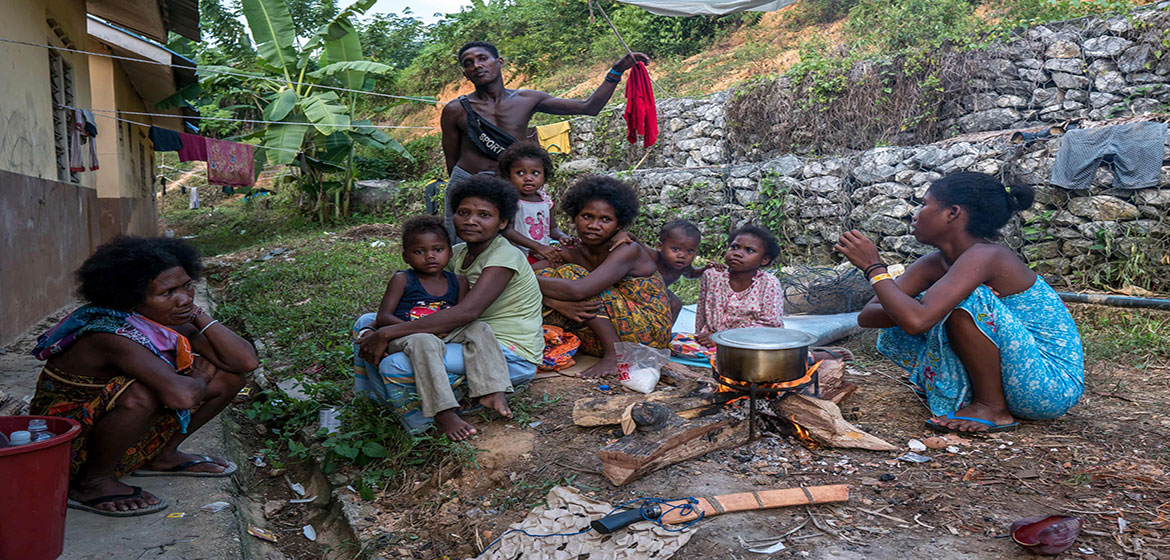The Batek started to die after being forced from their land. Were they poisoned by the plantations and mines that replaced their homes? The government is in no hurry to find out…
by Hannah Ellis-Petersen in Kuala Koh
It swept over the settlement like a plague. First came a fever, then their throats swelled up, their eyes became bloodshot and their lungs rattled with coughing. And then they began to die.
Over two weeks in May, 15 members of Malaysia’s last nomadic people, the Batek, were killed by this , while more than 100 were hospitalised. By the end, only about 20 of the 186 people in the tribe living in their Kuala Koh settlement were left untouched.
“It was very scary for us,” said Sita Keladi, a member of the tribe. “We did not know what was happening but people were dying around us. I got sick, my eight children got sick, my granddaughter got sick too, and she is four months old.”
A full government investigation was pledged, including autopsies of bodies that could be recovered from the jungle where they had been given traditional burials. Yet, four months later, nothing has materialised. It is the latest never-fulfilled promise to be made to the Batek people since their jungle home, south of the Thai border, began to be torn down over a decade ago to make way for palm oil plantations and, more recently, manganese mines – stripping them of their way of life and autonomy.
“They cut down our jungle, destroyed our home, and then poisoned our environment,” said Uncle Johan Tahun, who at 60 years old has become one of the oldest men left in Kuala Koh. Everyone else his age has died.
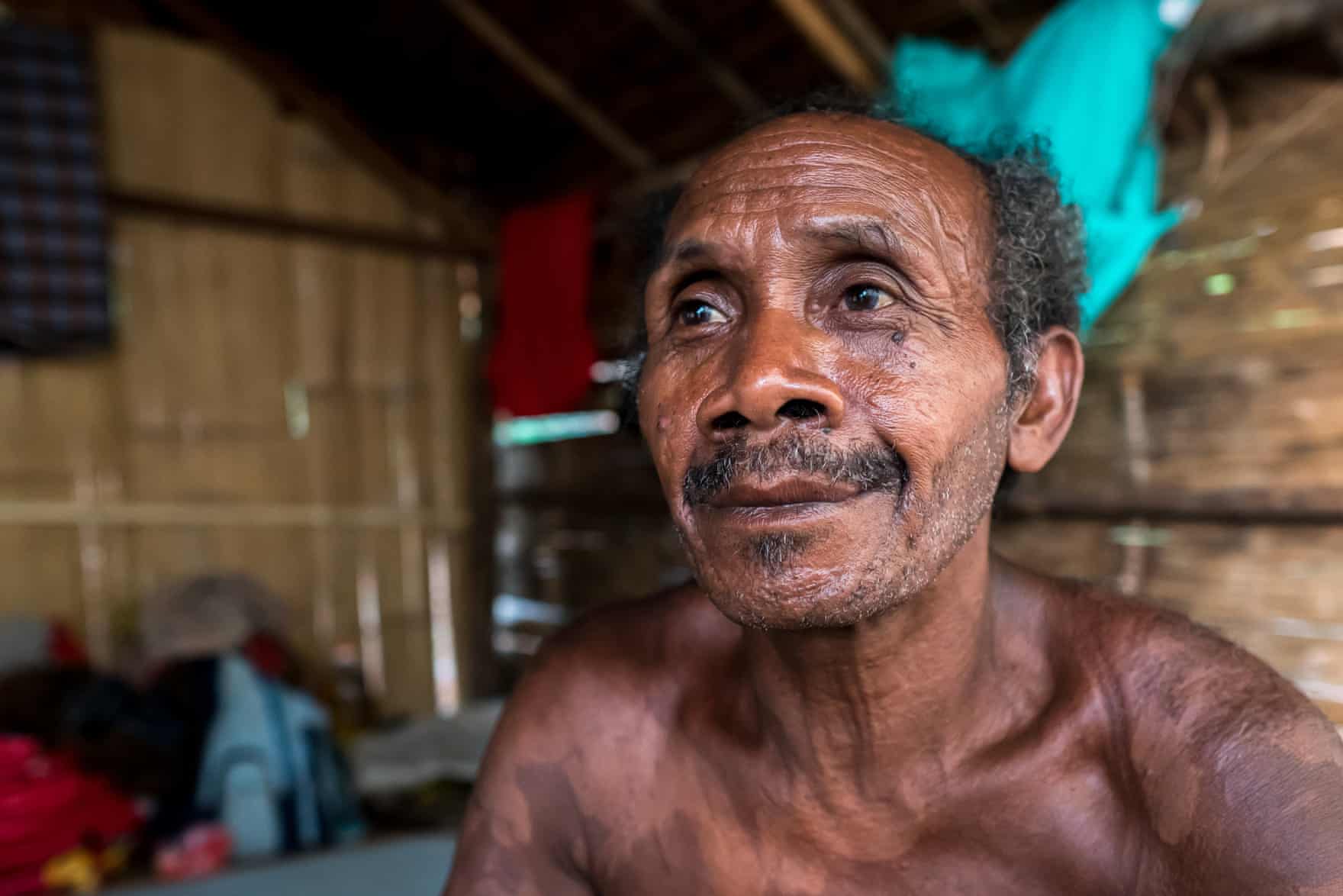
Johan Tahun, Batek elder
They cut down our jungle, destroyed our home, then poisoned our environment
The Batek are just one of the tribes of Malaysia’s 200,000 indigenous Orang Asli, which loosely translates as “aboriginal people”. They are the oldest inhabitants of the Malaysian peninsula, and for centuries lived as often nomadic hunter-gatherers. It was their unparalleled knowledge of the jungle that meant that last month one tribe was called upon to lead the , who tragically died in the Malaysian jungle while on holiday with her family.
But, far from being valued and respected for their knowledge and way of life, the Orang Asli have been subjected in recent years to various “relocation” and “integration” programmes, which have often proved catastrophic. Their ancestral land has been ravaged, and those who have defended it have been harassed or killed. The average lifespan of the Orang Asli barely pushes 50; they have the lowest literacy rates in the country and are subject to overt prejudice and racism. The Kelantan Islamic council, an influential regional religious body, has an explicitly stated mission to convert all Orang Asli to Islam in the next 20 years.
The Batek living in Kuala Koh are widely regarded as one of the most neglected of the Orang Asli. Until 2010 their nomadic way of life was rooted firmly in the jungle, but in 2007, without consultation, bulldozers moved in and the trees began to be felled around them to make way for vast plantations of trees for palm oil. Their home was ravaged as thousands of acres of jungle were flattened and replanted with palms. is a lucrative crop in high global demand that has since become the source of great controversy for the devastating environmental impact it has had in Malaysia and Indonesia. It is now the subject of an EU ban.
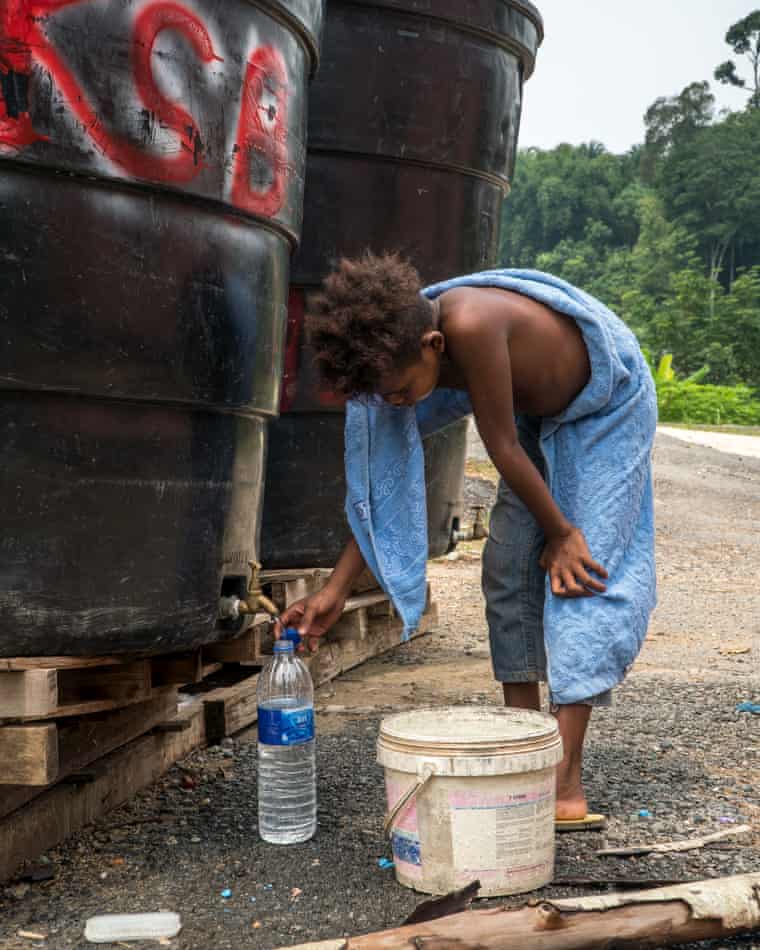
A young boy of the Batek tribe collects water.
In 2010 the federal government gave the tribe a piece of land with half a dozen concrete houses to form a settlement. Although the houses were equipped with sinks, they still have no running water or electricity. Furnished only with muddied sleeping mats and bright orange tents erected in some of the rooms where they sleep, these houses are dark and dirty. With bars on the windows, they resemble prison cells. The nearest school is over 60 miles away, meaning most in the tribe are barely literate, and without the jungle nearby they have to rely on sporadic handouts for food.
“These people have been completely neglected for years, the government does not care what happens to them,” said Johan Halid of organisation Sahabat Jariah, who has been visiting the tribe for more than a decade. “Without the jungle, they have nothing, and without access to power and schools there is also no way for them to integrate into society. If we did not bring them food, they would not survive. It is as simple as that.”
Without the jungle, they have nothing. If we did not bring them food, they would not survive | Johan Halid, aid worker
It was Halid who, back in early May, when people in the tribe began falling ill and dying, attempted to get the authorities to send medical help. For weeks, he said, his calls were ignored. It was not until his social media post went viral that, on 4 June, the department of health sent a van to take them to hospital.
There were too many sick people to take in one day, but it took another five days for a second van to come to the settlement. They had to wait until a national holiday had ended to pick up the rest. In the meantime, two more Batek, including a young child, had died in the village. Rosli Long, whose three-year-old son died in hospital on 7 June, said this was “just how things are for us”. “What more can I say?” he said. “My son is gone; I cannot bring him back.”
Dr Faizul Nizam Abu Salim, the special officer to the director-general of health , told the Observer that “investigations [into what afflicted the Batek] and proceedings” were ongoing. The ministry of health has attempted to declare measles as the cause of death.
But the tribe and advocates for the Orang Asli are scathing of the claim. They believe environmental factors – as well as rampant neglect and malnutrition – led to the tribe being ravaged by disease. They cite the vast quantities of pesticides used on the palm plantations, and detritus and explosives from a nearby manganese mine, as worrying causes of contamination. Manganese, a highly valuable element used in phone batteries and the making of stainless steel, has long-term health impacts when consumed at high levels, including chronic ill health, damage to the brain, liver, heart and other organs, as well as being associated with high infant mortality, a key issue within the Batek tribe.
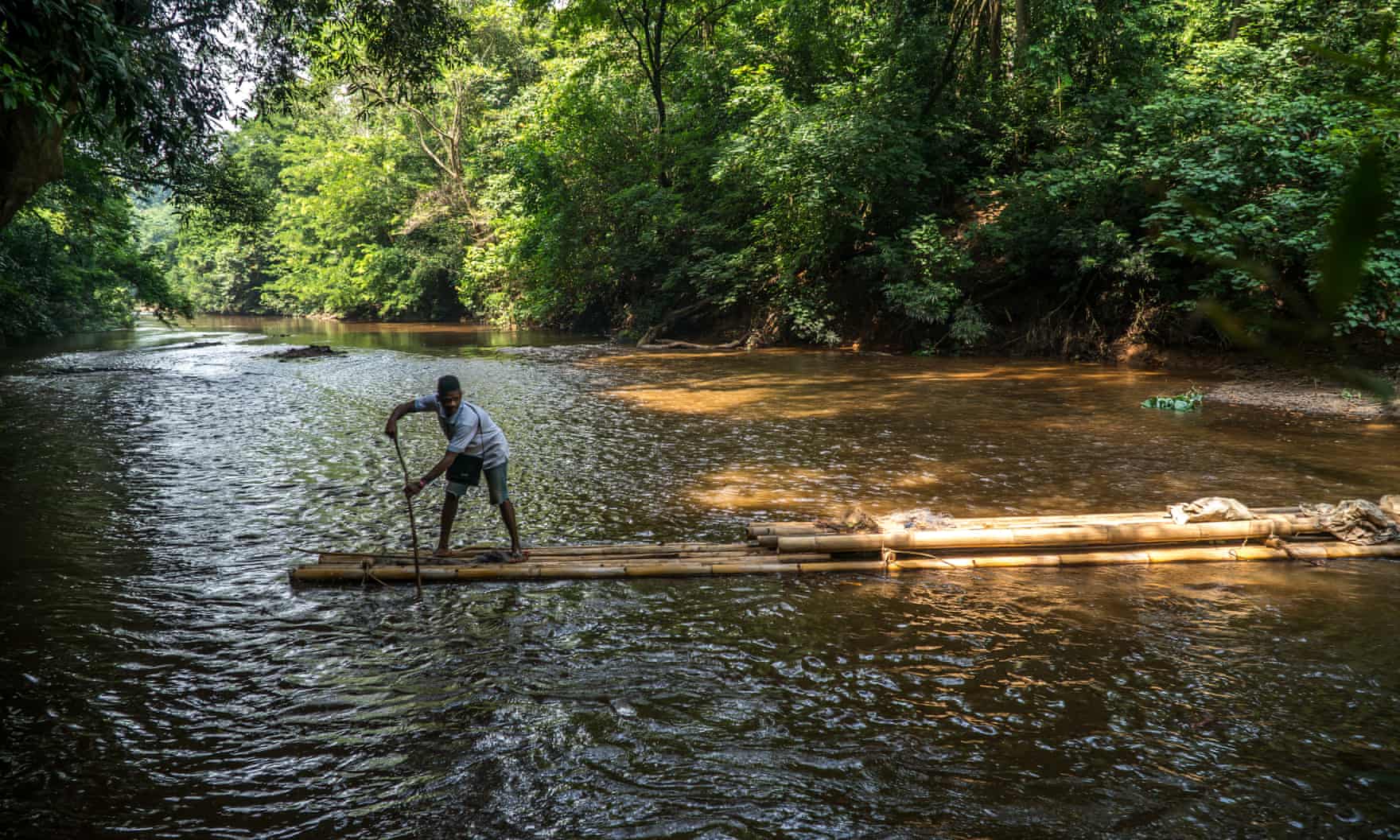
A young man of the Batek tribe crosses a river on a makeshift bamboo raft.
Indeed, according to Dr Steven Chow, president of the Federation of Private Medical Practitioners’ Associations Malaysia (FPMPAM), the detrimental health effects of manganese are amplified tenfold for the Batek, whose immune systems are already compromised from chronic malnutrition.
“Based on our research and the pattern of deaths, there was an outside environmental factor of either poisoning by another chemical, another pollutant or an extremely high level of manganese from the mine that was at least partially responsible for this spate of deaths,” said Chow, who has visited the Batek tribe many times. “The government has promised us a report and an investigation, but so far nothing.”
Local private testing done by the FPMPAM, and seen by the Observer, showed unhealthy levels of metals, including manganese, and faecal material in the Batek’s only water supply. One water source had 25 times the amount of manganese deemed healthy for human consumption by the Malaysian ministry of health.
In the report submitted to the ministry of health by the FPMPAM, the Batek’s habitat was described as a “death trap”. It definitively concluded that the only water supply was “not suitable for human consumption unless it is extensively treated”.
The findings came as no surprise to the tribe. Denied access to running water, the Batek’s only water supply is from a mountain stream that is collected in a small pond and then piped into the village. Before the manganese mine began operations in 2016, the water would always run clear, but now as soon as it rains it goes murky, often turning a reddish colour. When the Observer visited the dam the water was a murky brown, with the reddish black stones – waste from the nearby manganese mine – scattered all around.
“It should be clear,” said Azie Ahmat, a tribesman, looking scornfully at the muddy pool.
“We can see with our own eyes, when it rains, toxic waste from the mine flows into the water and it changes colour to red or brown, gets contaminated,” said Mohammad Pokok, 42, a villager. “But nobody cares if we are drinking poisoned water. We don’t know for sure but I think it is one of the reasons for the sickness.”
When it rains, toxic waste from the mine flows into the water and it changes colour to red or brown | Mohammad Pokok, villager
Chow dismissed the government’s claim that an outbreak of measles had caused the deaths: “I think the government wants to bury this matter and move on.”
“There should be accountability for these deaths that goes right to the top,” he added, “but I doubt it will ever happen. In 20 years I would not be surprised if there is barely any of the tribe left.”

Water pipe delivering contaminated water to the Batek tribe.

Deforestation next to the magnesium mine
The Batek’s nomadic ways are not entirely gone. Many still make a monthly journey to the jungle to find sandalwood to sell, and small amounts of food, though it is a long and arduous walk and their profits are never enough to live off. Sitting deep in the jungle under a plastic sheet hung over bamboo, around four miles from their Kuala Koh settlement, Jamal Rafi, 27, cooked fish over an open fire as his two children, Ishah, seven, and Ee, five, played around him. Things felt safer in here, he said, but it was not feasible long term as “our old way of life has gone”.
“Outside it is hard but at least we have houses, people bring us food and maybe things will get better,” said Jamal. “This jungle used to be our home but not any more.”
The jungle now lies in logged ruins. Three years ago the state government handed over land designated to the tribe to another palm oil company, who ripped up all the tribe’s planted trees and tore down a camp they had constructed. The company promised the village 10,000 ringgit (£2,000) in compensation, but the money has yet to materialise. Then in 2015, the clearance of more than 1,000 acres for the manganese mine began.
Sitting in a rickety bamboo shelter, Uncle Johan Tahun’s mottled skin, deep wrinkles and hunched frame make him look decades older than his 60 years. “After they started clearing the jungle, one by one, people here got sick. Our bodies are always hot and our skin burns from the sun,” he said. “When the jungle was intact, people in the tribe were living to 70, 80. Now not even our children are surviving.”
Pulling a pandan leaf cigarette from behind his ear, he shook his head. “We feel lost. We have lost our identity, our way of life. Everything gone too fast.”
How Malaysia’s rainforests were laid waste
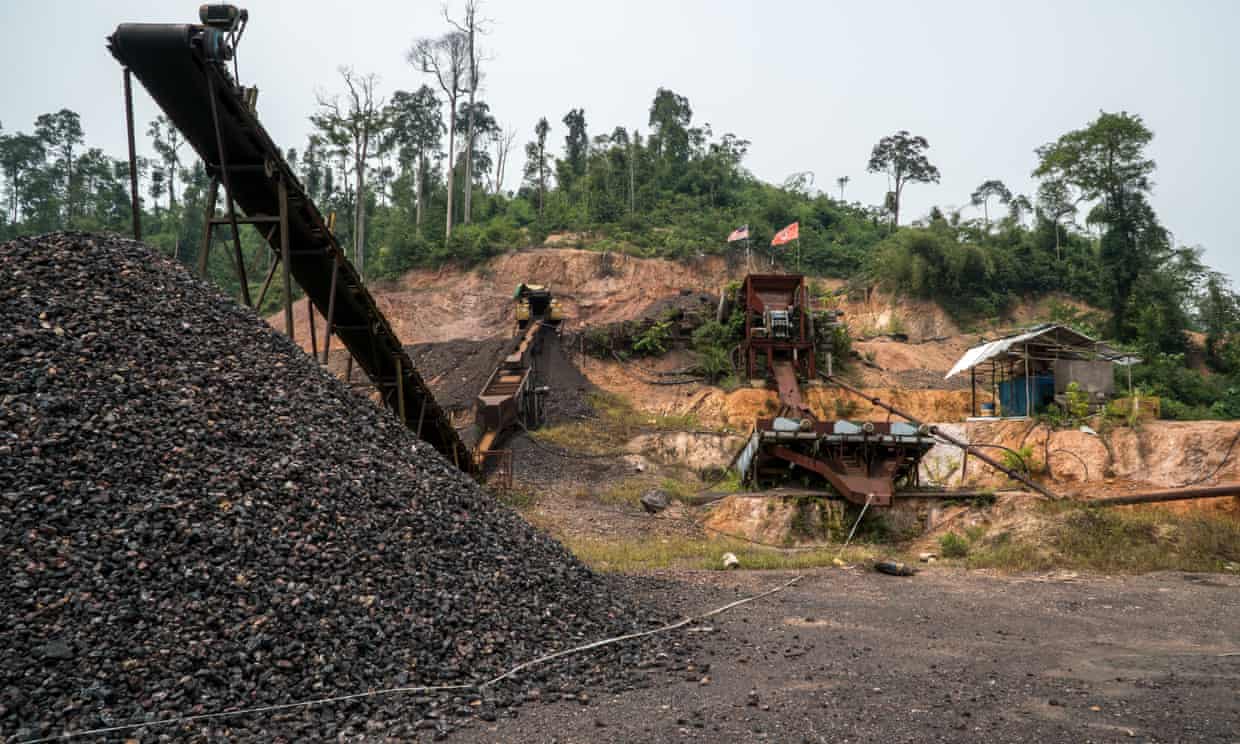
The manganese mine that opened in 2016 and is thought to be harming the Batek tribe.
Malaysia has paid a high price for being one of the world’s largest producers of palm oil, which over the past decade has become one of the most in-demand oils, used in products from biofuels to processed food and beauty products.
In the 1980s, the clearing of huge areas of jungle in the Malaysian state of Sabah for oil palm cultivation led to the proportion of forest coverage declining from 51% to 15%. A 2013 study estimated that between 1990 and 2008, 1.4 million hectares of forest in Malaysia were lost to palm oil plantations, wreaking environmental havoc and devastating the habitats of critically endangered animals, including orangutans and tigers.
Yet, while Malaysia has come under fire from environmental bodies and the EU over deforestation for palm oil plantations, its government has staunchly defended the trade.
To worsen the situation, it has also focused on attempting to make Malaysia the Asian centre for the lucrative mining and production of manganese - to meet growing demand from China but resulting in further deforestation. It has actively encouraged foreign investment in the manganese industry through tax incentives and increased the numbers of licenses for manganese mines.
Over the past decade, Malaysia has gone from producing almost no manganese ore to annual output in excess of a million tonnes.
Source:
SDG 10: Reduced inequalities

